Modi-Shah's BJP has resurrected dangers and the enemy from the past and built a scary jingoism.
It's a great diversionary tactic, but history shows it never ends well, points out Shekhar Gupta.
Illustration: Uttam Ghosh/Rediff.com

In the course of my usual trawling of the Hindi media, I am struck by lyrics from a very distant, faded past.
It was Kavi Pradeep's dire warning to India to watch out for threats from traitors within.
These deadly enemies, the song featuring mega star Rajendra Kumar and sung in Manna Dey's stirring voice said, were hiding in our own homes, and menacing us over our walls: Jhaank rahe hain apne dushman, apni hee deewaron se/sambhal ke rehna apne ghar mein chhupe huye gaddaron se.
It goes on to warn the patriot in us: Hoshiyar tumko apne Kashmir ki raksha karni hai (awake, for you have to also protect your Kashmir).
This was for Mahesh Kaul's Talaq, released and nominated for the Filmfare awards in 1958. Why has this again popped up in the heartland chatter?
You will also find references that Nehru disliked the song so much, as it insinuated that many fellow Indians were enemies, that he banned the song.
And, of course, facing a war in 1965, Lal Bahadur Shastri lifted the ban.
Just see, the argument goes, how relevant is this song again today -- when the enemy is at the gates, and millions of traitors hide within our homes.
Never mind the facts, of course.
In 60 years, after winning two-and-a-half wars, dividing Pakistan into two and becoming a $2.7 trillion economy, you would have thought we were much too secure, prospering and optimistic to bring back paranoias of the past.
But, after traversing large parts of India, in the Hindi heartland and the South, I have to report with humility that the contrary is exactly what the BJP under Narendra Damodardas Modi and Amit Anilchandra Shah has been able to achieve.
At a time when India should be feeling at its most secure, internally and externally, they've managed to convince large enough sections of the voters, especially the tens of millions of young who learn their history from WhatsApp and believe India came out of the dark ages in 2014, that the dangers of their grandparents's era have returned.
So, who else can you trust to fight these but a strong, aggressive and fearless leader who doesn't think twice before sending commandos on surgical strikes or jets on bombing missions in enemy territory?
With the situation on the economy and jobs grim and the crisis so palpable that it couldn't be 'fixed' with propaganda, we had anticipated Modi-Shah turning this into a 'desh khatrey mein hai' national security election.
We can now say they're succeeding.
There are three pre-requisites to building a 'national security' election.
The first, an aggressive, even paranoid redefinition of the national interest.
Second, a formidable foreign enemy a true nationalist detests, hates and fears.
And most important, a Fifth Column within, consisting of collaborators and sympathisers of the same enemy.
Then you go out and seek votes against those no one can morally or politically defend.
To call this merely politics of polarisation is an understatement.
It is enormously more diabolical, and effective.
The key to building such a popular concept of the national interest is a sharp definition of identity.
American strategist and Harvard professor Joseph Nye Jr, writing in Foreign Policy, calls the national interest a 'slippery concept, used to describe as well as prescribe foreign policy'.
He then goes on to quote Samuel Huntington in the same journal, arguing that 'without a secure sense of national identity' you cannot define your national interests.
I bet you have figured where I am headed.
But, just in case you haven't, that identity is Hindu and the core of Indian nationalism.
What's good for the Hindus is also good for India and vice versa had better be true.
If it isn't, it needs fixing.
And non-Hindus? Of course, they will benefit similarly.
But if they complain, or not conform, they risk being lumped with the Fifth Column, along with liberal bleeding hearts, questioning journalists, activists, 'compulsive contrarians' and 'urban Naxals'.
Remember Kavi Pradeep's warning about traitors hiding in your bedrooms and kitchens.
This is exactly how Modi-Shah have built this campaign.
The Opposition with Nyay, Rafale, secularism, equality is playing a very different game.
It's like one side is marching to martial music while the other is tuning the tanpura.
All of those ideas are important as well, but then you see, none of it will be possible unless the nation survives.
And since there are such grave dangers lurking, in whose hands would you rather place the nation? A proven, decisive and strong leader or a 'Pappu' who now you see and now you don't?
While an all-conquering nationalist wave isn't here, it is strong enough to neutralise some of the economic distress and disaffection.
In the deepest countryside, you find young, jobless and quite hopeless people saying, yes, we have nothing to do and are hurting, but we can suffer a bit for the nation.
It takes some campaign genius to get so many in distant places to succumb to such mass suspension of disbelief.
We may find the idea ridiculous and abhorrent.
But it won't change the reality.
The other factor is identity.
This wave is generally moderated, even blocked, where large sections of the population have a determinant of political identity stronger than the Hindu religion.
It can be caste, as with the Vokkaligas in Karnataka and the Yadavs in the heartland and Dalits generally everywhere.
It can be language and ethnicity as in the Tamil and Telugu regions.
Or religion, as with Muslims and Christians.
Wherever some of these factors combine, especially as in Uttar Pradesh, this upsurge can be broken.
This is why the Congress is the biggest loser.
Unlike the many regional parties, it doesn't have the hedge of alternative identities.
Its Rahul-era idea of fighting hard, even militant nationalism with liberal pacifism is unconvincing, especially given its own record of running a brutally unforgiving hard state.
If you think the counter to the BJP's campaign against "enemies and traitors" is abolishing the sedition law, you have no idea what you are up against.
What the Modi-Shah BJP has succeeded in building among large sections of the younger electorate is more than a mere sense of paranoid nationalism.
It is now a dangerous jingoism and history tells us it never ends well.
The enemies have been defined, and weapons earmarked: Jets and commandos for the Pakistanis, calumny and social media lynching for those within.
The dangers and the enemy Kavi Pradeep identified, and which we thought we had vanquished, have been conveniently resurrected and the Hindi press is the first to see that trend.
Sixty years later now, the current mood has been captured by a young poet, although of a different generation and style: Rap.
Check out Jingostan from the recent Ranveer Singh-Alia Bhatt hit Gully Boy: Do hazar atthra hai, desh ko khatra hai/har taraf aag hai, tum aag ke beech ho/zor se chilla do, sab ko dara do, apni zehreeli been baja ke, sabka dhyan kheench lo... (it's 2018, the nation's in peril/we are all caught in a deadly fire/shout, scream, scare, play your venomous fiddle, divert everybody's attention).
Because, as the rapper concludes: Jingostan is where we now live.
By special arrangement with The Print

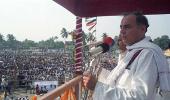
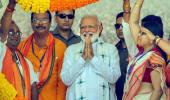

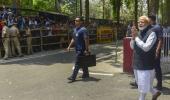
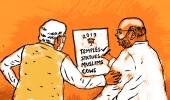





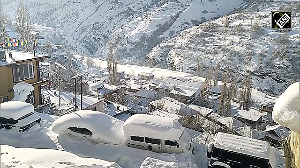
 © 2025
© 2025